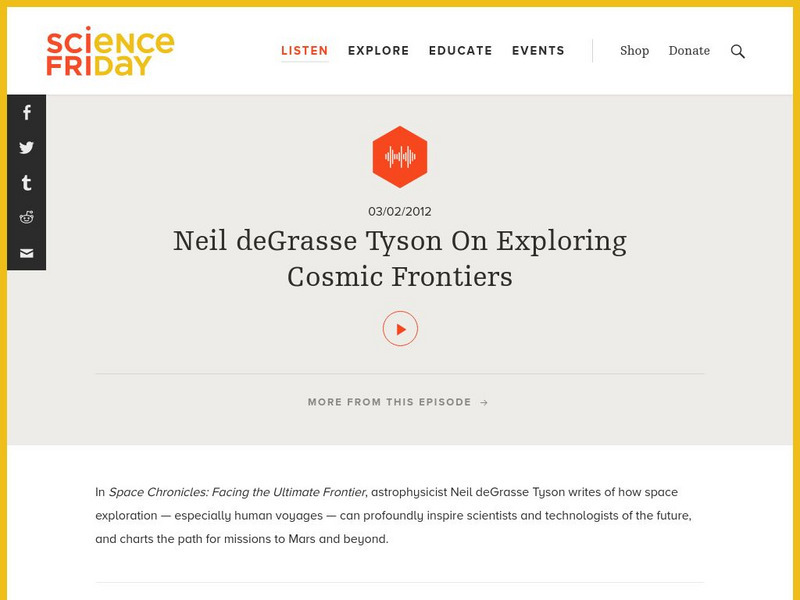Hi, what do you want to do?
Science Friday Initiative
Science Friday: Remembering Michael De Bakey
Pioneering heart surgeon Michael DeBakey died at the age of 99. Science Friday takes a look back on his life and work, especially regarding coronary bypass surgery and ventricular assist devices. [5 min, 52 sec]
Science Friday Initiative
Science Friday: Video Pick: Gotta Dance
Writing in the journal Biology Letters, scientists examine how women perceive different male dance movements. We'll find out more. [4:27]
Science Friday Initiative
Science Friday: Science and the Economy: Rush Holt
Ira talks with Rush Holt, plasma physicist and member of the U.S. House of Representatives, about how the troubled economic times may affect the outlook for science and technology in the US. [9:12]
Science Friday Initiative
Science Friday: Multi Drug Resistant Infections
Drug-resistant superbugs are on the rise. Doctors identified a strain of the bacteria responsible for the common ear infection that is resistant to all antibiotics approved for use in children. [15]
Science Friday Initiative
Science Friday: Watching a Supernova
Astronomers conducting observations of one recent supernova happened to have an orbiting observatory aimed in the right direction collecting data when they caught the first signs of a second supernova in the neighborhood, letting them...
Science Friday Initiative
Science Friday: Turning Down Your Ears
Do the ears have a built-in protection against loud sounds? New research finds that the ears may be able to turn down the volume to avoid damage. [12:28]
Science Friday Initiative
Science Friday: Malaria Update
New research tackles the question of why don't mosquitoes get malaria. [6:43]
Science Friday Initiative
Science Friday: Researchers Make a Stink to Fight Mosquitoes
Researchers are using new smells to confuse hungry mosquitoes and keep them from making meals of us. [13:12]
Science Friday Initiative
Science Friday: Mosquitoes Engineered to Kill Their Own Kind
Researchers hope to crash populations of dengue-transmitting mosquitoes, using genetic engineering. [12:19]
Science Friday Initiative
Science Friday: 50 Years of Pheromones
Fifty years ago, the word pheromones was first used in the scientific literature. Find out the implications of this form of chemical communication within the same species.
Science Friday Initiative
Science Friday: Caterpillar Mimicry
How does a parasitic caterpillar survive inside an ant nest? According to research published this week, it sounds like a queen ant.
Science Friday Initiative
Science Friday: Stem Cells in Review
Researchers announced a significant advance in stem cell science, changing skin cells into cells that seem to behave like embryonic stem cells. Science Friday talks about the research and where the field goes from here. [30:18]
Science Friday Initiative
Science Friday: Monkey Clones and Stem Cells
Researchers report that they have been able to extract embryonic stem cells from cloned monkey embryos. [5:18]
Science Friday Initiative
Science Friday: Towards Test Tube Meat?
In this segment, Science Friday talks about the possibility, and how close science is to being able to grow a lab-made steak for your weekend cookout. [17:48]
Science Friday Initiative
Science Friday: Testing Relativity With Better Clocks
With a precise enough clock, it's possible to test the time-dilation effects predicted by Einstein's theory of relativity without a space ship. [8:55]
Science Friday Initiative
Science Friday: Predicting Earthquakes
Is it possible to predict earthquakes? While one researcher says radon readings gave early clues that a 6.3 quake in Italy, other earthquake experts aren't so sure. [7:5]
Science Friday Initiative
Science Friday: A Doctor Tells All in "Confessions of a Surgeon"
In a new book, Surgeon Paul Ruggieri takes readers and listeners behind the operating room doors.
Science Friday Initiative
Science Friday: Live Earth Concerts Kick Off Worldwide
Can music stop global warming? Science Friday talks with some of the organizers of the 'Live Earth' concerts across the globe.
Science Friday Initiative
Science Friday: Why Is the u.s. Still Overweight?
With so many diets and dieters, why are Americans collectively getting bigger? Science Friday discusses this growing concern in this episode.
Science Friday Initiative
Science Friday: Lunar X Prize
Can big prize money spark a new race to return to the moon? In this segment, listen to Lunar X-Prize founder Peter Diamandis as he discusses the X Prize competition to send robots to the moon.
Science Friday Initiative
Science Friday: Women, Girls, and Math
In this episode of Science Friday, they take a look at the progress American girls are making in mathematics.
Science Friday Initiative
Science Friday: Rotifers, Reproduction, and the Red Queen
New research tackles the question of how one species of aquatic microorganism has managed to survive without the benefit of sexual reproduction for millions of years.
Science Friday Initiative
Science Friday: Ice Age Extinctions
Scientists discuss their ideas about what led to the extinction of Ice Age animals. Aired Sep. 28, 2007 [7:44]
Science Friday Initiative
Science Friday: Neil De Grasse Tyson on Exploring Cosmic Frontiers
Listen to astrophysicist Neil deGrasse Tyson talk about how space exploration, especially human voyages, can profoundly inspire scientists and technologists of the future, and charts the path for missions to Mars and beyond.




























